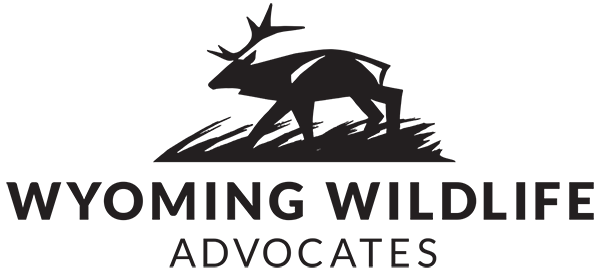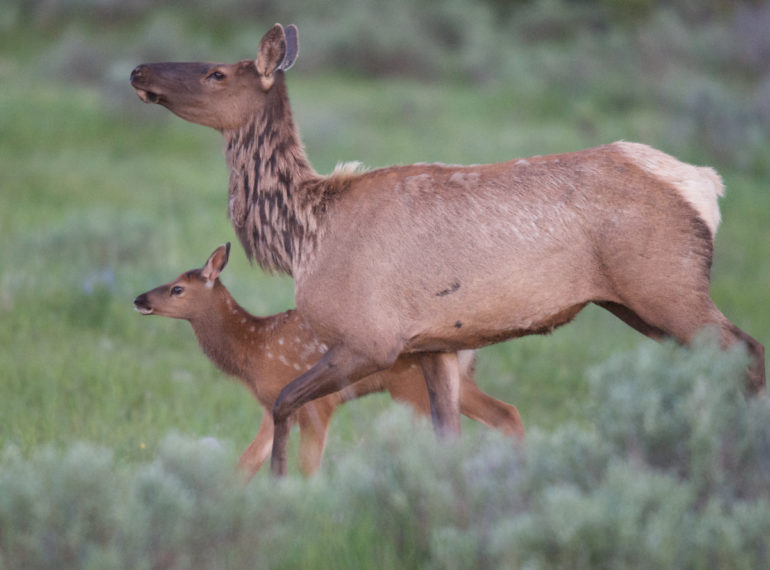In a lawsuit filed in District Court today, a coalition of conservation groups allege that, contrary to explicit direction in 2018 to the United States Forest Service from the United States District Court of Wyoming, the Forest Service is permitting continued winter elk feeding at the Alkali Creek feedground in the Gros Ventre drainage without adequate environmental analysis. In addition, the groups charge that the Forest Service is allowing feeding of dense herds of elk each winter at Dell Creek feedground in Sublette County and Forest Park feedground in Lincoln County without appropriate analysis of the harmful impacts of feeding on wildlife and without any examination of alternatives that would eliminate or at least phase out this ecologically destructive practice on federal public lands.
“Even with fatal chronic wasting disease now surrounding all three of these elk feedgrounds, the Forest Service continues to ignore science, ignore legal directives, and put Wyoming wildlife at grave risk of catastrophic disease,” said Connie Wilbert, Director of Sierra Club Wyoming Chapter.
In defiance of the court’s directive, in a December 2019 Decision Memo the Bridger-Teton National Forest decided to allow the Wyoming Game and Fish Department to conduct “emergency feeding” of hundreds of elk at Alkali Creek for at least five more years, without conducting a comprehensive analysis as directed by the court.
“Our challenge is needed because the Forest Service has gone to great lengths to keep its head deeply buried in the sand about the threat that feedgrounds pose as hubs for chronic wasting disease spread.” said Jonathan Ratner of Western Watersheds Project. “The Wyoming Game and Fish Department and Forest Service are busy concentrating elk in large numbers at winter feedgrounds, doing everything they can do to accelerate the spread of this deadly non-native disease among elk.”
According to the new complaint, filed on the groups’ behalf by the public interest law firm Eubanks and Associates, LLC, elk feeding at Dell Creek and Forest Park is also being conducted by the Wyoming Game and Fish Department without appropriate permits, which expired nearly four years ago without any appropriate renewal of federal authorization since that time. The conservation groups maintain that, in addition to failing to follow the court’s directive to adequately analyze impacts and reasonable alternatives at Alkali Creek feedground, the Forest Service has failed to conduct the necessary environmental analysis for Dell Creek and Forest Park elk feedgrounds.
“To continue to operate feedgrounds without a proper analysis of the impacts and long-term effects on elk herds is both short-sighted and irresponsible,” said Kristin Combs of Wyoming Wildlife Advocates. “Unnaturally concentrating elk by luring them together with artificial feeding increases densities which facilitates the spread of all diseases including chronic wasting disease. We can no longer continue business as usual and ignore the devastating impacts feedgrounds could have on our elk herds.”
Clint Nagel, President of the Gallatin Wildlife Association, also noted that, “Exacerbating, propagating, or knowingly taking actions that encourage wildlife disease to spread is not the role of wildlife management or land management agencies.”
In 2017, the same groups successfully challenged the Bridger-Teton National Forest’s decision to permit feeding at Alkali Creek, charging that the agency had failed to take a “hard look” at the environmental consequences of artificial feeding at Alkali Creek, including the impacts of feeding on the rapid spread of chronic wasting disease. In 2018, the District Court located in Cheyenne vacated and remanded a 2015 decision permitting Alkali Creek elk feedground back to the Forest Service, ordering the agency to correct its substantial permitting deficiencies.
The conservation groups, including Sierra Club, Western Watersheds Project, Wyoming Wildlife Advocates, and Gallatin Wildlife Association, have repeatedly noted that analysis of the Gros Ventre native winter ranges indicate that there is ample natural forage to sustain thousands of elk and other big game over winter, rendering feedgrounds unnecessary. Fire has rejuvenated plant communities in the watershed in recent years, and potential elk conflicts with livestock are few, according to the groups.
The groups are being represented by the public interest law firm Eubanks & Associates, LLC, which litigates public interest cases in federal trial and appellate courts throughout the country.
###

